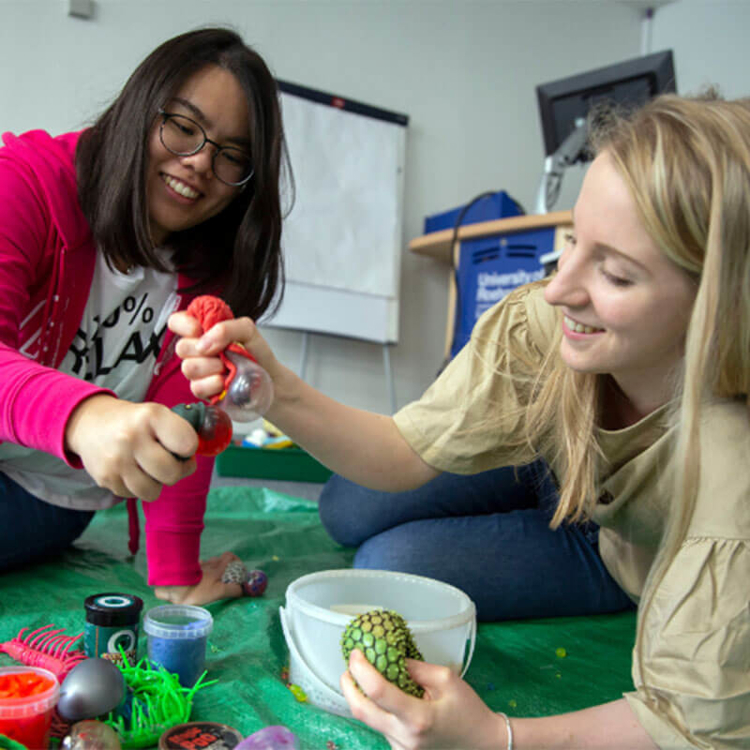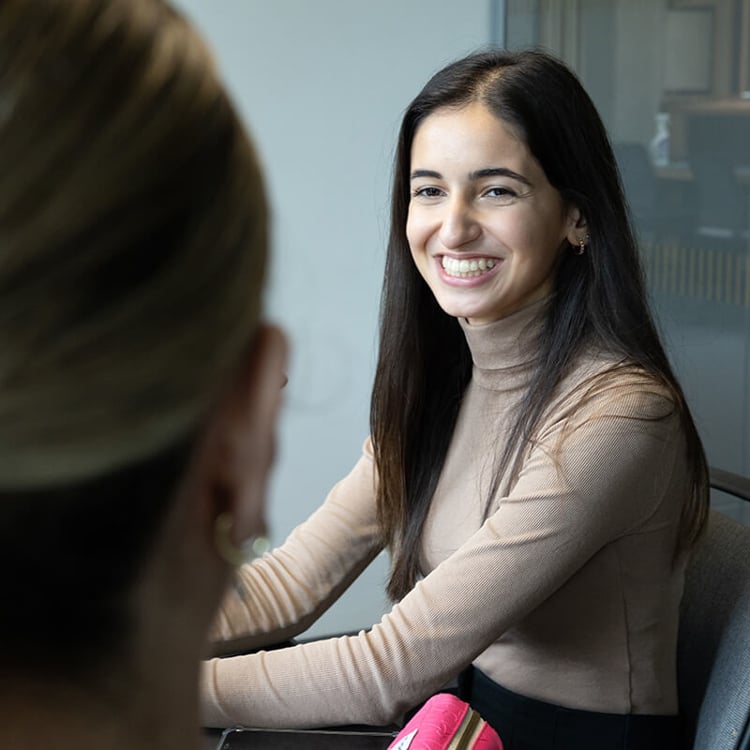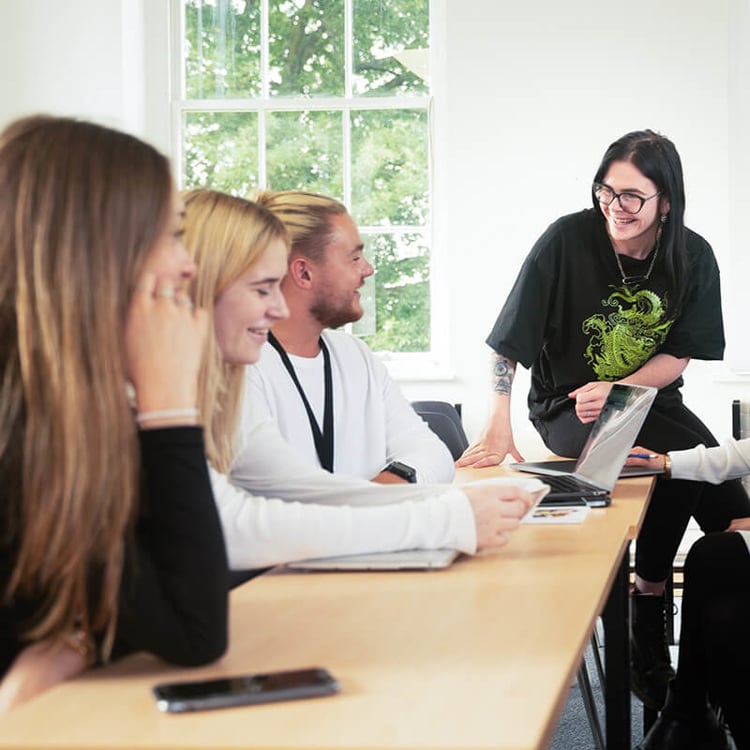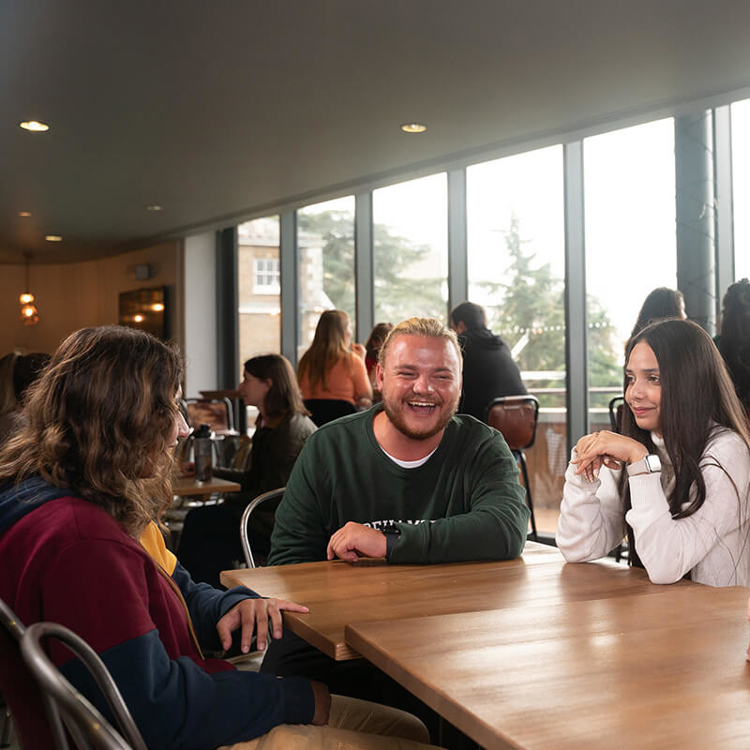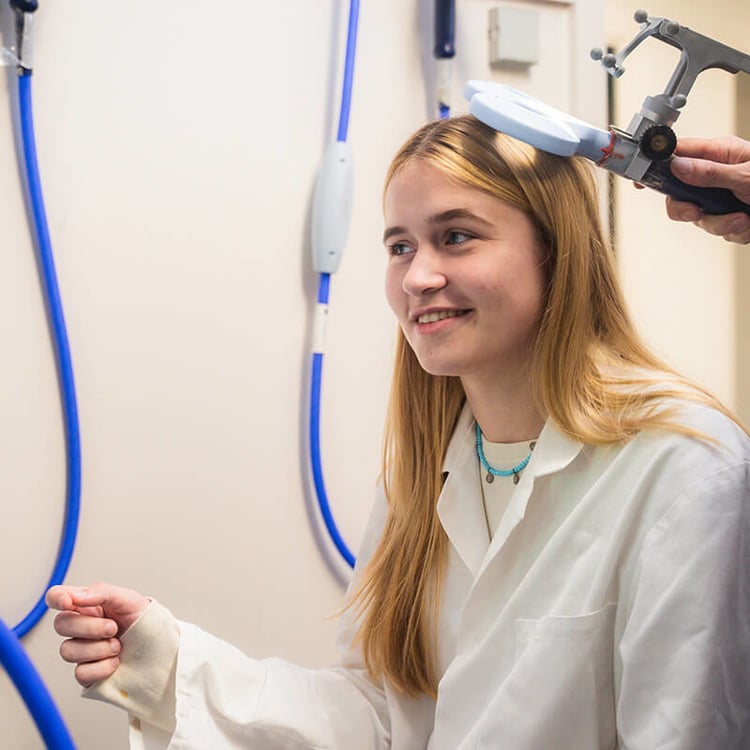Duration:
2 years (full-time)
3 years (part-time)
Number of credits:
180
Start date(s):
September 2025
September 2026
This two year full-time programme integrates theoretical learning, clinical skills and in-depth personal development to prepare graduates for clinical practice, predominantly with children, as a professional play therapist within the public and private sectors.
Did you know?
This is the longest standing British Association of Play Therapists (BAPT) accredited Masters level Play Therapy training course in the UK.
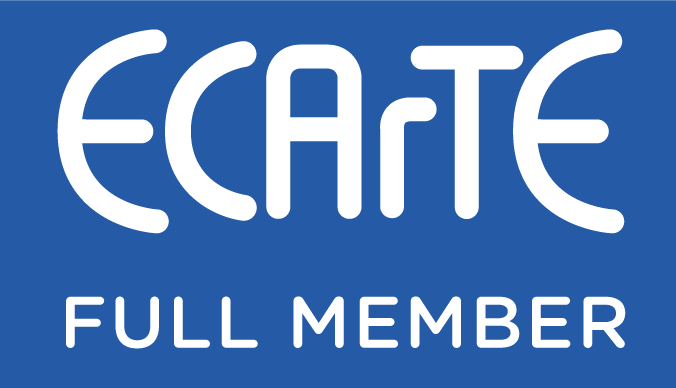
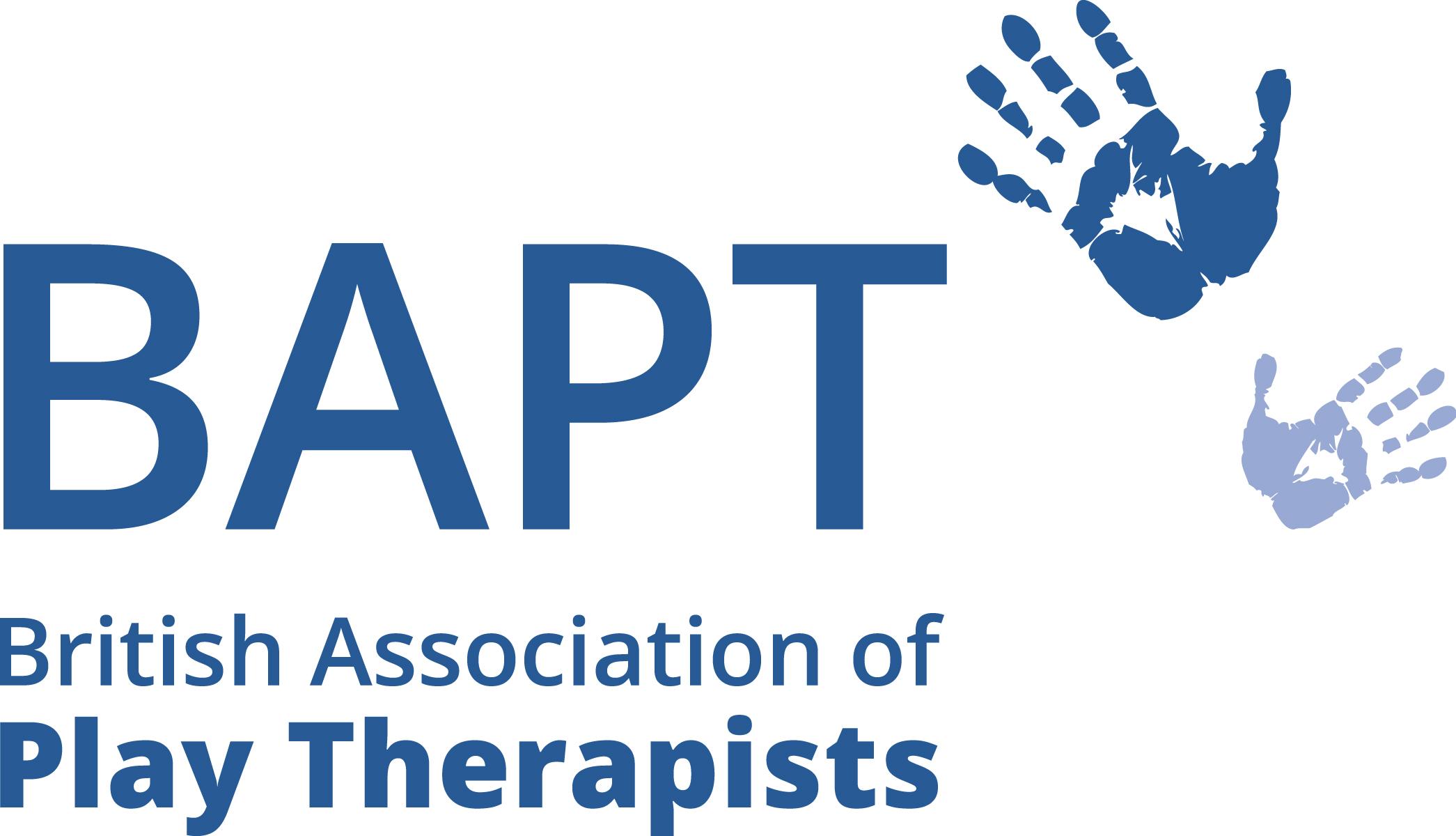
Modules
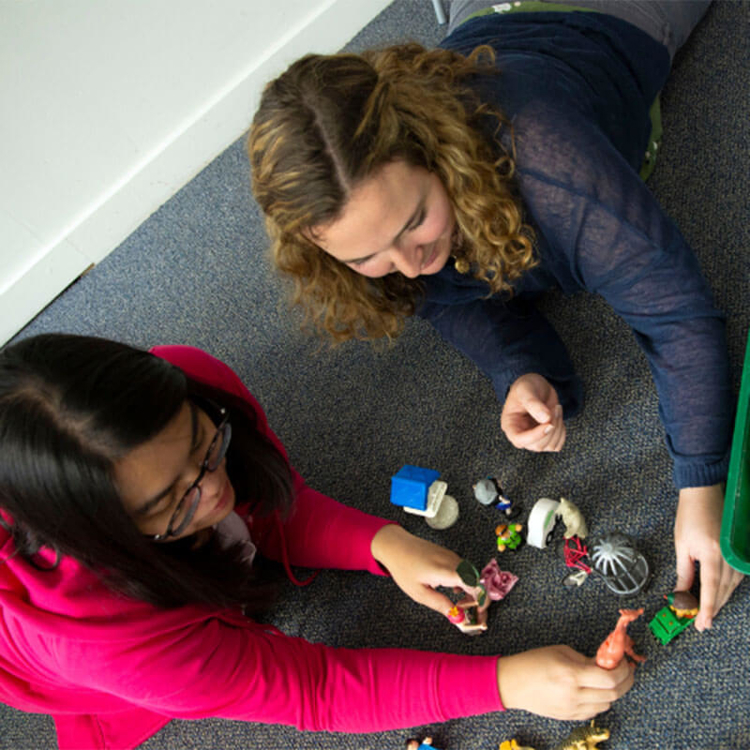
Skills
This course is based on a humanistic person-centred model of therapy.
It emphasises the use of play within a therapeutic relationship between the therapist and client to facilitate therapeutic change.
The course encompasses theoretical, practical and experiential learning. With our holistic approach to teaching, you will be provided with thorough and systematic knowledge, experience, skills and the confidence to work as a professionally qualified play therapist.
At the end of the course, you will be able to demonstrate a comprehensive understanding of therapeutic techniques and approaches that are required for professional registration purposes.
This course leads to a qualification that entitles you to registration as a Full Member of the British Association of Play Therapists (BAPT) - subject to reaccreditation - whose register is accredited by the Professional Standards Authority (PSA).
You will be taught by experienced practitioners who are practising play therapists and will bring the teaching on the course to life by drawing upon their own clinical experiences and case materials.
Learning
All modules are designed to prepare you for child-centred therapeutic practice that is theoretically sound and emotionally aware, complying with the core competencies of a play therapist as specified by the British Association of Play Therapists.
This intense, rigorous and comprehensive programme is made up of ten modules that encompass the theoretical, practical and experiential learning experience required to become a professional play therapist.
All students are required to be in personal therapy for the duration of the course.
In your first year, the modules will include experiential learning to prepare you for your first work placement, as theoretical understanding will give you a strong grounding for your clinical practice. Your professional development is inter-related with the development of theoretical knowledge, skills and personal awareness.
In the second year, you will build upon your play therapy skills and knowledge from your first year modules. You will have the opportunity to develop and explore your understanding of the theory and practice of play therapy in relation to working with different client groups and more complex needs.
You will also synthesise your theoretical knowledge and clinical experience to pursue your research interest in the Research Portfolio module. A clinical issue, your own clinical work or a professional issue may provide the inspiration for this research project. Recent research areas have included: child-centred play therapy and the use of therapeutic boundaries, play therapy and unresolved bereavement issues, play therapy in schools, and play therapy and different cultural beliefs.
How competitive is it to get onto the course?
We receive approximately 80-90 applications each year. Preparing thoroughly is important in order to ensure that you have the required skills, abilities and experience (see further information below).
What if I don’t have a degree and/or professional qualification?
We look at each application very carefully to see if an applicant is suitable for our programme. On occasion, we accept special entry applicants who do not hold a degree or professional qualification. Applicants without a degree need to have worked professionally in a relevant field for a considerable amount of time (e.g., 10+ years) and can demonstrate the ability to engage successfully in, and manage the demands of, Master’s level training. In such special cases, candidates may also have extensive clinical experience and be able to demonstrate the essential qualities expected of a play therapy trainee, including a high level of self-awareness and insight.
What if I don’t have a discipline-relevant degree?
If you have a degree that is not directly related to training as a play therapist (e.g., an undergraduate degree in theatre or art) but you would like to train as a therapist, you will need sufficient relevant work experience (see below) and demonstrate on your application form that you have enough psychological knowledge and insight to compensate for not having formally studied within this field. Also, you would need to show that you can apply such knowledge in the workplace. Candidates may find it helpful to undertake an Level 3/4 counselling course (CPCAB https://www.cpcab.co.uk/qualifications/ has further information) before applying for the MA Play Therapy training.
What is relevant work experience?
You need to work directly with children (ideally between the ages of 5-11) and their families who experience emotional, psychological and/or behavioural difficulties. Your work might involve assessing, planning and undertaking interventions to promote change for the children and their families. This should also involve experience of working or liaising with different professionals (e.g., health, social services, education) in some way or another. Some possible work settings might be schools, family centres, voluntary agency projects, social care support teams, pupil referral units, CAMHS teams, etc. Work may be voluntary but such cases should be consistent and involve clear duties and responsibilities.
N.B. You will need a minimum of two years’ full-time work experience following an undergraduate degree if you have a professional qualification/discipline-relevant degree.
Am I too young or too old?
Each application is assessed according to our minimum entry requirements and age is not a factor.
What should I include in my personal statement?
When completing the personal statement (500-1,000 words) section of your application, you should aim to cover the following main areas:
- What has led you to want to train as a therapist; you should demonstrate some insight into how your life experience has led to this application.
- A reflective account of your experience of work with children and their families, particularly with client groups with whom play therapists generally work (such as children with emotional, psychological and/or behavioural difficulties; other areas of work may also be relevant). Such experience is a mandatory pre-requisite for training.
- Your creative/playful background and your understanding of its relationship to understanding self and others.
- Your understanding, so far, of the nature of play therapy as a distinctive discipline (in particular as practised in the UK). You should mention relevant courses, conferences and reading, any meetings with play or other therapists, personal therapy/development etc. Please be ready to discuss this at interview.
Your personal statement is also an indication of how well you express yourself in writing and should therefore demonstrate:
- A standard of written English adequate to support postgraduate study
- Academic ability sufficient to support postgraduate study
- Personal maturity, self-awareness and a reflective capacity.
What happens at the interview day?
The selection process aims to ensure that students admitted to the programme are likely to complete it successfully. The MA Play Therapy programme will place high demands on students, their abilities and their personal resources. Therefore the selection process has to be thorough and rigorous.
The interview day will involve a presentation to candidates about the programme and an opportunity to ask questions. Candidates will also participate in group sessions involving both the capacity to use creative metaphors and to engage in critical discussion of a theoretical paper. Subsequent individual interviews will take place with members of the programme team. Candidates will be invited to focus on their work experience, their rationale for wanting to become a play therapist as well as to reflect on their personal development and life experience. An appreciation of, and readiness for, the demands of master’s level study will also be discussed.
Can I do my placement where I work?
No. Work and placement demands can be very difficult to manage simultaneously and our experience is that it is better for students to have clear distinctions between the two.
I have already had therapy - do I need to have it again?
Yes. Being in personal therapy while you are training is essential for your therapeutic learning and support during your training.
Can I transfer credits from another Play Therapy training?
The usual credit transfer system between universities does not apply to therapy training at Roehampton, with the exception in some cases of the other BAPT-accredited programmes at the University of South Wales or Queen Margaret’s University, Edinburgh.
Shall I wait for all my documents before I apply?
The application process takes some time so you can submit your initial application and obtain references and copies of documents while this is being processed. However, any offer of a place is conditional upon submission of all the evidence.
Interview days are held approximately on a monthly basis during the year and we run a rolling admissions process. Candidates interested in applying for the course are invited to attend the Open Afternoon/Evening events for the Arts and Play Therapies programmes.
Are there additional costs to consider?
In addition to the tuition fees, you will need to budget for further external expenses. These include:
- Weekly personal therapy throughout the training with a minimum of 30 hours per year; please refer to BACP and/or UKCP websites to find out current fees charged by therapists;
- External clinical supervision (minimum of 35 hours in Year 2); please see the BAPT website for fees charged by BAPT-approved clinical supervisors , approximately £45+ per hour);
- Annual BAPT Student membership (£38 + one-off £10 administration fee);
- Travel to placement;
- Personal indemnity insurance;
- DBS registration;
- Purchase of some play therapy resources for placement;
- Use of a video camera for placement recordings;
- Ongoing costs, such as printing/book purchases, travel to placement, etc.
Is there any funding available?
The vast majority of home/EU Play Therapy students are self-funding or access government loans. More information about funding opportunities can be found on our finance pages.
How can I get a taster?
For a taster in our approach we run one-day Introductory Days twice a year (spring and sutumn) and a 5-day Summer School each year. There is also an annual 20-week Foundation Course (Wednesday evenings at Roehampton, Thursday evenings at a venue in Northampton) which run from November to April.
Please see the Short courses website.
N.B. It is possible to do some of the above online but it should be noted that the MA Play Therapy is only offered as an on-campus training.
What percentage of alumni find subsequent employment in play therapy?
Many play therapy graduates go on to establish rewarding careers as play therapists. Due to the demanding nature of the work, some prefer to find employment on a part-time basis and maintain some work in their other professional capacity, e.g., as a social worker. Many graduates create their own independent practice, establishing contracts with schools, fostering and adoption agencies, charities, etc. This enables them to work flexibly and in ways that suit their circumstances. Play Therapy is a growing profession in the U.K. and with increased awareness of the mental health issues affecting children and young people, it is an exciting time to be part of this developing field.
We also offer weekend introductory courses, 5 day Summer Schools, and 20 week part time evening Foundation Courses which provide a useful background in related professions. For more information, see our Psychology Short Courses.
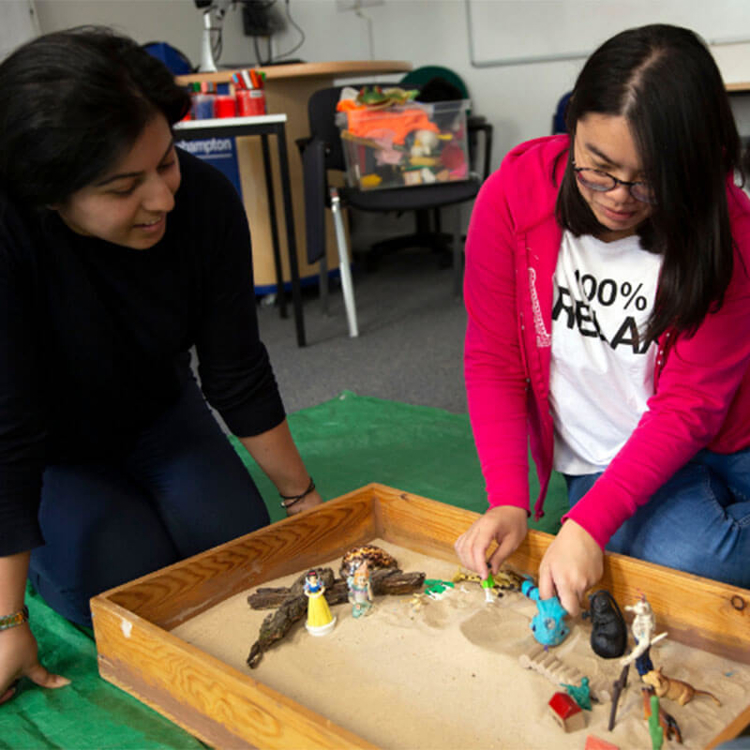
Placements
You will complete two specified periods of supervised clinical placements alongside your studies.
The clinical placements are a central component to the training in this programme, where you will synthesise, integrate and apply all aspects of your learning into practise.
Career
Graduates work as a registered play therapist for both the private and public sectors.

Open days
Get a real taste of our campus, community and what it’s like to study at Roehampton
Applying
UK postgraduate students apply through our direct application system.
This course uses a gathered field approach to process applications. Find out more information on how we will process your application.
Application deadline: 7 July 2025.
Interview date(s): 28 July – 11 August 2025.
Specific entry requirements
All eligible applicants to the programme will be interviewed by the Programme Convener and/or the Programme staff. Selection will be based on the following admissions criteria:
- Applicants will normally be required to hold an honours degree at undergraduate level (usually 2.1 or higher); in most cases this will be in a modality-relevant degree such as in psychology, early childhood studies, education or health & social care.
- Applicants with a relevant degree will be expected to have the equivalent of at least two years of full-time experience of working with children and young people, especially between the ages of 5-11, in a professional capacity. N.B. In most cases work experience must be gained as a graduate, i.e., work experience gained whilst studying will not be considered. The exception to this is if the applicant has worked in a full-time capacity for a number of years (e.g., 5 years+) in a role with children prior to gaining an undergraduate degree; only in this circumstance will prior work experience be considered.
- Applicants who do not hold a degree in a modality-relevant area will be expected to have considerable (5+ years) full-time experience of working in a professional capacity with children and young people. This might include working with children with behavioural or developmental challenges, learning difficulties, child mental health, etc. This work can either be done on a voluntary or employed basis.
- Applicants need to evidence that they can meet the academic demands of a Master’s degree and will be required to prepare and submit a written personal statement to support their application; in some circumstances an applicant may be asked to submit an essay prior to/after interview.
- It is recognised that this is a postgraduate training where applicants are qualified, experienced and valued practitioners in their fields; applicants are encouraged to bring prior learning and experience to the training, thus enhancing the breadth and depth of the programme learning.
- An understanding of the nature of play therapy as a distinctive discipline (in particular as practised in the UK) and a capacity for playfulness and creativity.
- Applicants should demonstrate a maturity of personality and self-awareness compatible with training as a therapist. Applicants need an appropriate degree of psychological mindedness including the capacity to form and maintain appropriate empathic relationships with clients. They should also demonstrate emotional literacy, robustness and an ability to be self-reflective. This will be ascertained by a combination of health screening, experiential activities and in-depth discussions at interview.
- An International English Language Testing System (IELTS) score of at least 7 with no element below 6.5 for applicants for whom English is not their first language.
- Applicants will be required to supply the names of two referees. If possible one of these should be able to comment on the applicant's academic suitability and the other on the applicant's clinical/personal suitability for the programme.
- In addition to these requirements, all students must be prepared to enter mandatory on-going personal therapy for the duration of the programme. Students should attend no fewer than 30 regular sessions within any calendar year. Payment for therapy is separate to course fees.
- All successful applicants will need to complete an enhanced Disclosure and Barring Service (DBS) check; payment for this is separate to the course fees.
- Equality and diversity information is logged within the application form and compiled data is sent to HESA for consideration. Student services confidentially contact successful applicants who have a stated disability on their application form, to explore what provisions can be made to support their learning.
- We also offer 20 week evening foundation courses which provide a broad outline and introduction in the arts and play therapies.
General entry requirements
September 2025 entry tuition fees (UK)
| Level of study | Full-time* | Part-time* |
| MA | £11,250 | £7,500 |
*Year 1 fee
We offer a wide range of scholarships and bursaries. See our financial support pages for UK students.
We also provide other ways to support the cost of living, including free buses and on-campus car parking, hardship support and some of the most affordable student accommodation and catering in London. Find out more about how we can support you.
Additional costs to consider
Personal Therapy
Students must complete at least 60 hours of personal therapy during training. Full-time students require 30 hours per year over two years, while part-time students need 20 hours per year over three years. Therapy is mandatory during clinical placement (BAPT requirement) and must be with a BACP- or UKCP-registered/accredited therapist. Costs vary, so applicants should check the BACP and UKCP websites for details.
Clinical Supervision
A minimum of 50 hours of clinical supervision is required—15–20 hours in Year 1 and 35–40 hours in later years, depending on study mode. This must be with a BAPT-accredited supervisor. Costs vary; applicants should check the BAPT website for guidance.
DBS Check
Students must apply and pay for an enhanced Disclosure and Barring Service (DBS) check, even if previously completed. Subscription to the DBS Update Service is recommended to reduce costs.
Personal Indemnity Insurance
Students must take out insurance during placements, typically costing £70–£90 per year, depending on the provider.
Travel Costs
Students should budget for travel to campus, placements, clinical supervision, infant observation, and therapy. While local options may be available, this is not always guaranteed.
Recording Equipment
Students must film their play therapy clinical sessions using a video camera with a removable micro-card and store recordings on an encrypted memory stick. Personal devices (e.g., phones, tablets) cannot be used.
Professional Membership
Students must become student members of the British Association of Play Therapists (BAPT) (£40 per year).
Play Resources
Some placements provide equipped playrooms, while others require students to supply their own materials. Guidance on purchasing and sourcing resources is provided during training.
Books
Students may need to buy core texts in addition to using the library’s lending services.
International postgraduate students apply through our direct application system.
This course uses a gathered field approach to process applications. Find out more information on how we will process your application.
Application deadline: 7 July 2025.
Interview date(s): 28 July – 11 August 2025.
Specific entry requirements
All eligible applicants to the programme will be interviewed by the Programme Convener and/or the Programme staff. Selection will be based on the following admissions criteria:
- Applicants will normally be required to hold an honours degree at undergraduate level (usually 2.1 or higher); in most cases this will be in a modality-relevant degree such as in psychology, early childhood studies, education or health & social care.
- Applicants with a relevant degree will be expected to have the equivalent of at least two years of full-time experience of working with children and young people, especially between the ages of 5-11, in a professional capacity. N.B. In most cases work experience must be gained as a graduate, i.e., work experience gained whilst studying will not be considered. The exception to this is if the applicant has worked in a full-time capacity for a number of years (e.g., 5 years+) in a role with children prior to gaining an undergraduate degree; only in this circumstance will prior work experience be considered.
- Applicants who do not hold a degree in a modality-relevant area will be expected to have considerable (5+ years) full-time experience of working in a professional capacity with children and young people. This might include working with children with behavioural or developmental challenges, learning difficulties, child mental health, etc. This work can either be done on a voluntary or employed basis.
- Applicants need to evidence that they can meet the academic demands of a Master’s degree and will be required to prepare and submit a written personal statement to support their application; in some circumstances an applicant may be asked to submit an essay prior to/after interview.
- It is recognised that this is a postgraduate training where applicants are qualified, experienced and valued practitioners in their fields; applicants are encouraged to bring prior learning and experience to the training, thus enhancing the breadth and depth of the programme learning.
- An understanding of the nature of play therapy as a distinctive discipline (in particular as practised in the UK) and a capacity for playfulness and creativity.
- Applicants should demonstrate a maturity of personality and self-awareness compatible with training as a therapist. Applicants need an appropriate degree of psychological mindedness including the capacity to form and maintain appropriate empathic relationships with clients. They should also demonstrate emotional literacy, robustness and an ability to be self-reflective. This will be ascertained by a combination of health screening, experiential activities and in-depth discussions at interview.
- An International English Language Testing System (IELTS) score of at least 7 with no element below 6.5 for applicants for whom English is not their first language.
- Applicants will be required to supply the names of two referees. If possible one of these should be able to comment on the applicant's academic suitability and the other on the applicant's clinical/personal suitability for the programme.
- In addition to these requirements, all students must be prepared to enter mandatory on-going personal therapy for the duration of the programme. Students should attend no fewer than 30 regular sessions within any calendar year. Payment for therapy is separate to course fees.
- All successful applicants will need to complete an enhanced Disclosure and Barring Service (DBS) check; payment for this is separate to the course fees.
- Equality and diversity information is logged within the application form and compiled data is sent to HESA for consideration. Student services confidentially contact successful applicants who have a stated disability on their application form, to explore what provisions can be made to support their learning.
- We also offer 20 week evening foundation courses which provide a broad outline and introduction in the arts and play therapies.
General entry requirements
September 2025 entry tuition fees (international)
| Level of study | Full-time* | Part-time* |
| MA | £18,250 | £12,170 |
*Year 1 fee
We offer a wide range of scholarships and bursaries. See our financial support pages for international students.
We also provide other ways to support the cost of living, including free buses and on-campus car parking, hardship support and some of the most affordable student accommodation and catering in London. Find out more about how we can support you.
Additional costs to consider
Personal Therapy
Students must complete at least 60 hours of personal therapy during training. Full-time students require 30 hours per year over two years, while part-time students need 20 hours per year over three years. Therapy is mandatory during clinical placement (BAPT requirement) and must be with a BACP- or UKCP-registered/accredited therapist. Costs vary, so applicants should check the BACP and UKCP websites for details.
Clinical Supervision
A minimum of 50 hours of clinical supervision is required—15–20 hours in Year 1 and 35–40 hours in later years, depending on study mode. This must be with a BAPT-accredited supervisor. Costs vary; applicants should check the BAPT website for guidance.
DBS Check
Students must apply and pay for an enhanced Disclosure and Barring Service (DBS) check, even if previously completed. Subscription to the DBS Update Service is recommended to reduce costs.
Personal Indemnity Insurance
Students must take out insurance during placements, typically costing £70–£90 per year, depending on the provider.
Travel Costs
Students should budget for travel to campus, placements, clinical supervision, infant observation, and therapy. While local options may be available, this is not always guaranteed.
Recording Equipment
Students must film their play therapy clinical sessions using a video camera with a removable micro-card and store recordings on an encrypted memory stick. Personal devices (e.g., phones, tablets) cannot be used.
Professional Membership
Students must become student members of the British Association of Play Therapists (BAPT) (£40 per year).
Play Resources
Some placements provide equipped playrooms, while others require students to supply their own materials. Guidance on purchasing and sourcing resources is provided during training.
Books
Students may need to buy core texts in addition to using the library’s lending services.


